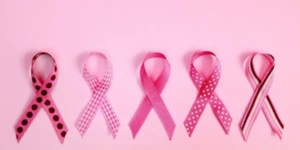 Breast cancer is the second most common form of cancer in women globally, only falling behind non-melanoma skin cancers. The five-year survivability rate of stage 1 breast cancer is about 99%, while stages 2 and 3 have survival rates of around 86% and 28%, respectively. Therefore, early detection is critical to increasing your chances of survival. Breast cancer can be detected earlier by routine mammograms and self-breast exams, saving your life.
Breast cancer is the second most common form of cancer in women globally, only falling behind non-melanoma skin cancers. The five-year survivability rate of stage 1 breast cancer is about 99%, while stages 2 and 3 have survival rates of around 86% and 28%, respectively. Therefore, early detection is critical to increasing your chances of survival. Breast cancer can be detected earlier by routine mammograms and self-breast exams, saving your life.
Symptoms
There are several types of breast cancer; however, breast cancer symptoms will vary depending on the specific type. While lumps are commonly a warning to see your doctor, you should also watch for other breast changes. Breast cancer symptoms can include:
- Redness
- Scaly skin or rash
- Orange peel texture or look
- Nipple discharge
- Inverted or sunken nipple
- Dimpling
- Lump in breast or armpit
- Enlarged lymph nodes in the armpit or around the collar bone
- Swelling
Risk Factors
One of the most well-known risk factors for breast and ovarian cancers is having a BRCA1 or BRCA2 gene. Around 5-10% of women with a history of breast cancer have one of these genetic mutations. The lifetime risk of developing breast cancer with one of these mutations is between 50-85%. If you have a history of other cancers or a close relative with cancer, you should consider testing for the BRCA1 and BRAC2 genes. Other risk factors include:
- Age, most breast cancers occur in women over 50
- Early-onset of menses or delayed menopause
- Certain types of combination hormone therapy and the use of combination birth control pills
- A history of benign growths in the breast, such as fibroadenomas that cause dense breast tissue
- Obesity
- Becoming pregnant after age 30
- Being a biological female, 99% of all breast cancer cases occur in women.
Mammograms and Breast Exams
When breast cancer is detected early, you have a much higher chance of survival. Performing a monthly self-breast exam on yourself can help detect changes in your breasts. Additionally, women of all ages should get in the habit of performing monthly self-breast exams. At age 40, women should consider talking to their doctor about when to start getting mammograms, and women between ages 50-74 should consider getting a mammogram every two years. If you have a higher than average risk of developing breast cancer, your doctor may recommend more frequent screenings.
Breast Cancer Awareness
Pink ribbons currently represent Breast Cancer Awareness Month. The entirety of October is dedicated to increasing awareness of breast cancer and raising money for breast cancer research. The third Friday of Breast Cancer Awareness Month is National Mammography Day. This annual day is a reminder for everyone to schedule their routine mammogram.
Breast cancer is a common cancer that has a potentially high survivability rate. Again, your chances of beating breast cancer increase with early detection. Mammograms can even detect changes in the breast before you can feel them on a self-breast exam. Never ignore the breast cancer symptoms.
If you notice any differences in your breasts, see your doctor as soon as possible. Contact New River Women’s Health for your healthcare needs. You can contact us online or call us at 540-605-7566

